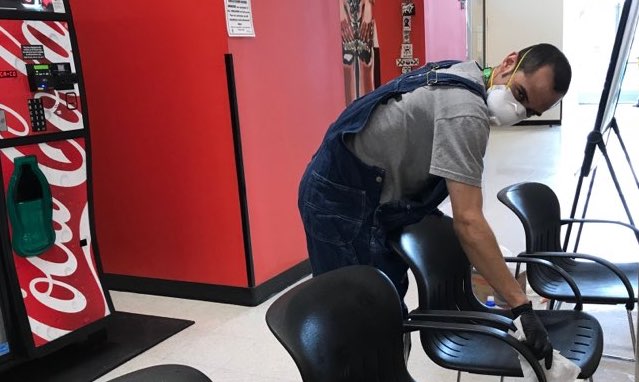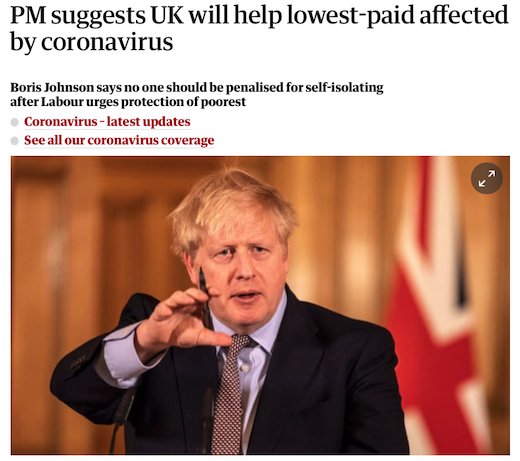Jonathan Cook says we have always been bound together in a miraculous web of life on our planet and beyond; stardust in an unfathomably large and complex universe.

Seattle Parks and Recreation staff responds to coronoavirus with additional maintenance of public spaces. (Seattle Parks, Flickr)
By JonathanCook
Jonathan-Cook.net
 If a disease can teach wisdom beyond our understanding of how precarious and precious life is, the coronavirus has offered two lessons.
If a disease can teach wisdom beyond our understanding of how precarious and precious life is, the coronavirus has offered two lessons.
The first is that in a globalized world our lives are so intertwined that the idea of viewing ourselves as islands – whether as individuals, communities, nations, or a uniquely privileged species – should be understood as evidence of false consciousness. In truth, we were always bound together, part of a miraculous web of life on our planet and, beyond it, stardust in an unfathomably large and complex universe.
It is only an arrogance cultivated in us by those narcissists who have risen to power through their own destructive egotism that blinded us to the necessary mix of humility and awe we ought to feel as we watch a drop of rain on a leaf, or a baby struggle to crawl, or the night sky revealed in all its myriad glories away from city lights.
And now, as we start to enter periods of quarantine and self-isolation – as nations, communities and individuals – all that should be so much clearer. It has taken a virus to show us that only together are we at our strongest, most alive and most human.
In being stripped of what we need most by the threat of contagion, we are reminded of how much we have taken community for granted, abused it, hollowed it out. We are afraid because the services we need in times of collective difficulty and trauma have been turned into commodities that require payment, or treated as privileges to which access is now means-tested, rationed or is simply gone. That insecurity is at the root of the current urge to hoard.
When death stalks us it is not bankers we turn to, or corporate executives, or hedge fund managers. Nonetheless, those are the people our societies have best rewarded. They are the people who, if salaries are a measure of value, are the most prized.
But they are not the people we need, as individuals, as societies, as nations. Rather, it will be doctors, nurses, public health workers, care-givers and social workers who will be battling to save lives by risking their own.
During this health crisis we may indeed notice who and what is most important. But will we remember the sacrifice, their value after the virus is no longer headline news? Or will we go back to business as usual – until the next crisis – rewarding the arms manufacturers, the billionaire owners of the media, the fossil fuel company bosses, and the financial-services parasites feeding off the money of other people?

(Katrina.Tuliao, CC BY 2.0, Wikimedia Commons)
‘Take it on the Chin’
The second lesson follows from the first. Despite everything we have been told for four decades or more, Western capitalist societies are far from the most efficient ways of organizing ourselves. That will be laid bare as the coronavirus crisis deepens.
We are still very much immersed in the ideological universe of Thatcherism and Reaganism, when we were told quite literally: “There is no such thing as society.” How will that political mantra stand the test of the coming weeks and months? How much can we survive as individuals, even in quarantine, rather than as part of communities that care for all of us?
Western leaders who champion neoliberalism, as they are required to do nowadays, have two choices to cope with coronavirus – and both will require a great deal of misdirection if we are not to see through their hypocrisy and deceptions.
Our leaders can let us “take it on the chin”, as the British prime minister Boris Johnson has phrased it. In practice, that will mean allowing what is effectively a cull of many of the poor and elderly – one that will relieve governments of the financial burden of underfunded pension schemes and welfare payments.
Such leaders will claim they are powerless to intervene or to ameliorate the crisis. Confronted with the contradictions inherent in their worldview, they will suddenly become fatalists, abandoning their belief in the efficacy and righteousness of the free market. They will say the virus was too contagious to contain, too robust for health services to cope, too lethal to save lives. They will evade all blame for the decades of health cuts and privatizations that made those services inefficient, inadequate, cumbersome and inflexible.

Or, by contrast, politicians will use their spin doctors and allies in the corporate media to obscure the fact that they are quietly and temporarily becoming socialists to deal with the emergency. They will change the welfare rules so that all those in the gig economy they created – employed on zero-hours contracts – do not spread the virus because they cannot afford to self-quarantine or take days’ off sick.
Or most likely our leaders will pursue both options.
If acknowledged at all, the conclusion to be drawn from the crisis – that we all matter equally, that we need to look after one another, that we sink or swim together – will be treated as no more than an isolated, fleeting lesson specific to this crisis. Our leaders will refuse to draw more general lessons – ones that might highlight their own culpability – about how sane, humane societies should function all the time.
Permanent Crisis
In fact, there is nothing unique about the coronavirus crisis. It is simply a heightened version of the less visible crisis we are now permanently mired in. As Britain sinks under floods each winter, as Australia burns each summer, as the southern states of the U.S. are wrecked by hurricanes and its great plains become dustbowls, as the climate emergency becomes ever more tangible, we will learn this truth slowly and painfully.
Those deeply invested in the current system – and those so brainwashed they cannot see its flaws – will defend it to the bitter end. They will learn nothing from the virus. They will point to authoritarian states and warn that things could be far worse.
They will point a finger at Iran’s high death toll as confirmation that our profit-driven societies are better, while ignoring the terrible damage we have inflicted on Iran’s health services after years of sabotaging its economy through ferocious sanctions. We left Iran all the more vulnerable to coronavirus because we wanted to engineer “regime change” – to interfere under the pretense of “humanitarian” concern – as we have sought to do in other countries whose resources we wished to control, from Iraq to Syria and Libya.
Iran will be held responsible for a crisis we willed, that our politicians intended (even if the speed and means came as a surprise), to overthrow its leaders. Iran’s failures will be cited as proof of our superior way of life, as we wail self-righteously about the outrage of a “Russian interference” whose contours we can barely articulate.
Valuing the Common Good
Those who defend our system, even as its internal logic collapses in the face of coronavirus and a climate emergency, will tell us how lucky we are to live in free societies where some – Amazon executives, home delivery services, pharmacies, toilet-paper manufacturers – can still make a quick buck from our panic and fear. As long as someone is exploiting us, as long as someone is growing fat and rich, we will be told the system works – and works better than anything else imaginable.
But in fact, late-stage capitalist societies like the U.S. and the U.K. will struggle to claim even the limited successes against coronavirus of authoritarian governments. Is either President Donald Trump in the U.S. or Prime Minister Boris Johnson in the U.K. – exemplars of “the market knows best” capitalism – likely to do better than China at containing and dealing with the virus?
This lesson is not about authoritarian versus “free” societies. This is about societies that treasure the common wealth, that value the common good, above private greed and profit, above protecting the privileges of a wealth-elite.
In 2008, after decades of giving the banks what they wanted – free rein to make money by trading in hot air – the Western economies all but imploded as an inflated bubble of empty liquidity burst. The banks and financial services were saved only by public bail-outs – tax payers’ money. We were given no choice: the banks, we were told, were “too big to fail”.
We bought the banks with our common wealth. But because private wealth is our era’s guiding star, the public were not allowed to own the banks they bought. And once the banks had been bailed out by us – a perverse socialism for the rich – the banks went right back to making private money, enriching a tiny elite until the next crash.
Nowhere to Fly
The naive may think this was a one-off. But the failings of capitalism are inherent and structural, as the virus is already demonstrating and the climate emergency will drive home with alarming ferocity in the coming years.
The shut-down of borders means the airlines are quickly going bust. They didn’t put money away for a rainy day, of course. They didn’t save, they weren’t prudent. They are in a cut-throat world where they need to compete with rivals, to drive them out of business and make as much money as they can for shareholders.
Now there is nowhere for the airlines to fly to – and they will have no visible means to make money for months on end. Like the banks, they are too big to fail – and like the banks they are demanding public money be spent to tide them over until they can once again rapaciously make profits for their shareholders. There will be many other corporations queuing up behind the airlines.
The banks that nearly tanked the global economy had to be bailed out because they were 'too big to fail'. Now we're about to do the same with airlines, even as they help to destroy the planet. Time to rethink our profit-driven priorities? https://t.co/kDjqSsITC1
— Jonathan Cook (@Jonathan_K_Cook) March 16, 2020
Sooner or later the public will be strong-armed once again to bail out these profit-driven corporations whose only efficiency is the central part they play in fuelling global warming and eradicating life on the planet. The airlines will be resuscitated until the inevitable next crisis arrives – one in which they are key players.
Boot Stamping on a Face
Capitalism is an efficient system for a tiny elite to make money at a terrible cost, and an increasingly untenable one, to wider society – and only until that system shows itself to be no longer efficient. Then wider society has to pick up the tab, and assist the wealth-elite so the cycle can be begun all over again. Like a boot stamping on a human face – forever, as George Orwell warned long ago.
But it is not just that capitalism is economically self-destructive; it is morally vacant too. Again, we should study the exemplars of neoliberal orthodoxy: the U.K. and the U.S.
In Britain, the National Health Service – once the envy of the world – is in terminal decline after decades of privatizing and outsourcing its services. Now the same Conservative party that began the cannibalizing of the NHS is pleading with businesses such as car makers to address a severe shortage of ventilators, which will soon be needed to assist coronavirus patients.
Once, in an emergency, Western governments would have been able to direct resources, both public and private, to save lives. Factories could have been repurposed for the common good. Today, the government behaves as if all it can do is incentivize business, pinning hopes on the profit motive and selfishness driving these firms to enter the ventilator market, or to provide beds, in ways beneficial to public health.
 The flaws in this approach should be glaring if we examine how a car manufacturer might respond to the request to adapt its factories to make ventilators.
The flaws in this approach should be glaring if we examine how a car manufacturer might respond to the request to adapt its factories to make ventilators.
If it is not persuaded that it can make easy money or if it thinks there are quicker or bigger profits to be made by continuing to make cars at a time when the public is frightened to use public transport, patients will die. If it holds back, waiting to see if there will be enough demand for ventilators to justify adapting its factories, patients will die. If it delays in the hope that ventilator shortages will drive up subsidies from a government fearful of the public backlash, patients will die. And if it makes ventilators on the cheap, to boost profits, without ensuring medical personnel oversee quality control, patients will die.
Survival rates will depend not on the common good, on our rallying to help those in need, on planning for the best outcome, but on the vagaries of the market. And not only on the market, but on faulty, human perceptions of what constitute market forces.
Survival of Fittest
If this were not bad enough, Trump – in all his inflated vanity – is showing how that profit-motive can be extended from the business world he knows so intimately to the cynical political one he has been gradually mastering. According to reports, behind the scenes he has been chasing after a silver bullet. He is speaking to international pharmaceutical companies to find one close to developing a vaccine so the United States can buy exclusive rights to it.
Reports suggest that he wants to offer the vaccine exclusively to the U.S. public, in what would amount to the ultimate vote-winner in a re-election year. This would be the nadir of the dog-eat-dog philosophy – the survival of the fittest, the market decides worldview – we have been encouraged to worship over the past four decades. It is how people behave when they are denied a wider society to which they are responsible and which is responsible for them.
Covid-19 is a real test of whether we continue to let politicians play us. They can support proper medical care for all, making our societies stronger; or like Trump they can race for exclusive rights to a vaccine in the hope of buying re-election https://t.co/H2uFAVW6aG
— Jonathan Cook (@Jonathan_K_Cook) March 16, 2020
But even should Trump eventually deign to let other countries enjoy the benefits of his privatized vaccine, this will not be about helping mankind, about the greater good. It will be about Trump the businessman-president turning a tidy profit for the U.S. on the back of others’ desperation and suffering, as well as marketing himself a political hero on the global stage.
Or, more likely, it will be yet another chance for the U.S. to demonstrate its “humanitarian” credentials, rewarding “good” countries by giving them access to the vaccine, while denying “bad” countries like Russia the right to protect their citizens.
Obscenely Stunted Worldview
It will be a perfect illustration on the global stage – and in bold technicolor – of how the American way of marketing health works. This is what happens when health is treated not as a public good but as a commodity to be bought, as a privilege to incentivize the workforce, as a measure of who is successful and who is unsuccessful.
The U.S., by far the richest country on the planet, has a dysfunctional health care system not because it cannot afford a good one, but because its political worldview is so obscenely stunted by the worship of wealth that it refuses to acknowledge the communal good, to respect the common wealth of a healthy society.
The U.S. health system is by far the most expensive in the world, but also the most inefficient. The vast bulk of “health spending” does not contribute to healing the sick but enriches a health industry of pharmaceutical corporations and health insurance companies.
Analysts describe a third of all U.S. health spending – $765 billion a year – as “wasted.” But “waste” is a euphemism. In fact, it is money stuffed into the pockets of corporations calling themselves the health industry as they defraud the common wealth of U.S. citizens. And the fraudulence is all the greater because despite this enormous expenditure more than one in 10 U.S. citizens has no meaningful health cover.
As never before, coronavirus will bring into focus the depraved inefficiency of this system – the model of profit-driven health care, of market forces that look out for the short-term interests of business, not the long-term interests of us all.
There are alternatives. Right now, Americans are being offered a choice between a democratic socialist, Bernie Sanders, who champions health care as a right because it is a common good, and a Democratic party boss, Joe Biden, who champions the business lobbies he depends on for funding and his political success. One is being marginalized and vilified as a threat to the American way of life by a handful of corporations that own the U.S. media, while the other is being propelled towards the Democratic nomination by those same corporations.
Coronavirus has an important, urgent lesson to teach us. The question is: are we ready yet to listen?
Jonathan Cook is a freelance journalist based in Nazareth.
This article is from his blog Jonathan Cook.net.
The views expressed are solely those of the author and may or may not reflect those of Consortium News.
Please Donate to Consortium News.
Before commenting please read Robert Parry’s Comment Policy. Allegations unsupported by facts, gross or misleading factual errors and ad hominem attacks, and abusive or rude language toward other commenters or our writers will not be published. If your comment does not immediately appear, please be patient as it is manually reviewed. For security reasons, please refrain from inserting links in your comments, which should not be longer than 300 words.

”The U.S., by far the richest country on the planet.”
Really? debt-to-GDP ratio of 107%, and that’s just the sovereign debt. Factor in all the private debt – private, car loans, student debt, financial debt, corporate debt, and now factor in unfunded future liabilities such as pensions and health expenditure and total debt would be considerably higher than sovereign debt. See below.
Public and government accounts:
As of December 31, 2018, debt held by the public was $16.1 trillion and intra-governmental holdings were $5.87 trillion, for a total of $21.97 trillion. Debt held by the public was approximately 77% of GDP in 2017, ranked 43rd highest out of 207 countries ….. Social Security’s annual Trustees Report came out recently, and it showed Social Security ran a gigantic $9 trillion deficit between last year and this year. The system’s long-term unfunded liability is now $43 trillion, up from $34 trillion last year.
Funny, nobody noticed.
‘… a choice between a democratic socialist, Bernie Sanders…’.
This is BS. He is a reformist and as such does not represent a threat to the status quo, something which is confirmed by history and current mainstream comment. ‘It should be clear to anyone who is not trying to frighten voters that Sanders is a social democrat..’ (marketwatch.com, 11 February). Similarly, we read: ‘In capitalist mecca Las Vegas, social democrat Sanders cements Democratic front-runner status’ (cbc.ca, 23 February). Both outlets identify him correctly as a social democrat rather than ‘ democratic socialist’ ( a tautological misnomer). Sanders has voted with the Democrats 98 percent of the time. Let us put his qualified support for $15/hour into context:
1865: ‘Instead of the conservative motto, A fair day’s wage for a fair day’s work, we must inscribe on our banner the revolutionary watchword, Abolition of the wage system’ (Marx, Value, Price, and Profit).
1928: ‘Earning a wage is a prison occupation’ (Wages, DH Lawrence).
1965: Workers still ‘don’t realise that they can abolish the wages system’ (Socialist Standard).
2019: $15/hour by 2024? (Sanders’ Raise the Wage Act).
Warren Buffett knows more about class: ‘there’s class warfare, all right, but it’s my class, the rich class, that’s making war, and we’re winning.’ He is correct: the top 0.1 percent of American households hold the same amount of wealth as the bottom 90 percent and every 38 seconds a U.S. citizen dies of poverty and poverty-related social conditions.
Sanders & his supporters as well as others chasing reforms help delay
that glorious day
When man on man no more shall prey
When prophets priests and kings
Are numbered with forgotten things
This is SportsCenter – Handshakes
see: youtube.com/watch?v=WtkN5GKde4Q
Jonathan makes so many good points it is impossible to focus on just one
When I saw the article, I thought of the recent reports that China is providing assistance to both Italy and Iran, and there is a report that Italy is asking for doctors from China and Cuba.
What struck me as I viewed the title was how different our behavior to countries in need. At the same time we are hearing about China and Cuba we are hearing of further sanctions on the stricken country of Iran We hear the same of Venezuela. In Syria the nation deprived of income to rebuild because our president decides to keep the oil.
Is capitalism the cause of such callous and cruel behavior, or is it something more basic? I wouldn’t know the answer to that only that all forms of government are dependent on the morals and behavior of the governors and we have nurtured a nest of very bad actors in Washington.
Democracy is dead. The intel services (aka shadow government) have an iron grip on the duopoly, the electoral process, and the media. Exit polls indicating large disparities in the vote counts of Democratic primaries go unreported. Ironically the US uses exit polls as a primary indicator of election validity in foreign countries. Bernie has ZERO chance, the primaries are rigged, the convention has 800 superdelegates ready to block him, and the general election will be just as fraudulent as the primaries. 20 years ago the Supreme Court would not allow a recount in Florida.
Every crisis is an opportunity. For a brief moment after 9/11 there was an opportunity to restructure global thinking and behavior. Then dubya called out ‘the axis of evil’ and said “you’re either with us or against us” and told citizens to ho shopping.
COVID-19 will be more of the same. It is just the second part of the repetitive cycle of pump-and-dump that damages the vast majority to benefit the 1%.
Because every crisis is an opportunity.
“It is just the second part of the repetitive cycle of pump-and-dump that damages the vast majority to benefit the 1%.”
Not the 2nd part but normal practice including “Democracy”, the vessel which some fill with their own “content” to attain somnolence.
Very good article to which I would like to add some thoughts and observations.
1/ “Climate Change” is a decidedly globalist agenda, whereas “COVID 19” is decidedly anti globalist.
2/ Both lend themselves equally to extracting enormous wealth “upwards”from the most vulnerable.
3/ To make profit from health you must promote and generate demand. That DEMAND is poor health!
I do believe that the POTENTIAL may emerge in the imminent ensuing chaos for a genuine “reset”, but am fearful that it may just result in even more and greater promotion of poor health.
Both climate change and SARS-CoV-2 are natural phenomena, not agendas. Neither lend themselves to any particular ideology. The tendency for wealth to be transferred upwards is to do with our economic and political system.
No doubt the epidemic will show the “depraved inefficiency” of profit-driven health care.
The lowest element always rises to power in unregulated market economies, and are the worst possible leaders: those “battling to save lives by risking their own” will get an obscure gravestone as the rich parasites continue to steal from our former democracy.
The Repubs certainly want “a cull … of the poor and elderly” while the Dems will claim socialism only in emergency. All will learn nothing, deny the structural failures, and tell us “how lucky we are” to live under their tyranny.
The rich will pay more for ventilators while the rest die waiting for the “morally vacant” West to produce more ventilators with greed incentives. Airlines and others will demand subsidies like the banks once bailed out with “socialism for the rich.”
We are so lucky to have gangsters as politicians, and we owe them our absence of moral education, collapse of higher social contracts, degeneration of community spirit into exploitation, and worship of greed and corruption as success. Who would run the government if we did not have gangsters? Liberty and Justice for gangsters!
Stunning in its accuracy and beauty, Jonathan. Thank you so very much.
Powerful truths, instinctively understood by most Americans who are bullied and bamboozled by wealth, power and the gargantuan transnational corporations to refute their own self interests and sacrifice themselves on the altar of Mammon. It looks for all the world that this crisis will become just one more opportunity for the elites to shear most of us like sheep, while leaving the rest for dead meat.
Very poignant remarks about health care workers essentially acting as the only real soldiers fighting for the survival of human society. The ones toting guns are merely hired thugs acting as enforcers in the interests of the filthy rich who own and control everything. I suspect their commanders will feel compelled to use them to start killing our own people “so the doctors can save lives.” At least that will be the narrative, because we never act like the foreign leaders and countries we demonize so frequently with those allegations.
This society will be radically transformed when it comes out from this crisis to the other side to a condition that will be trumpeted as a return to “normality” by the power brokers. Actually, the new normality will be one of two possibilities: either a more cowed and regimented society, sort of like Mao’s China after the Cultural Revolution, or a fragmented country overthrown by desperate revolutionaries and run by the equivalent of disparate local warlords–you know, the oft-predicted balkanization of an ever feuding North America. Maybe some local bosses will be enlightened or at least benign. We all hope to see the future whichever way it goes because, hey, what’s the alternative?
I have not considered the scenario of “a fragmented country… run by… local warlords” mainly because the centralized military power would prevent military secessions as in the US civil war. If we escape a “more cowed and regimented society” after perhaps a century of repression and poverty and anger (perhaps following international blockades of the US), it seems likely that organized attacks on enclaves of the rich throughout the US would yield concessions, ultimately restoring some semblance of democracy. That has never happened without generations of anger.
The first signs of progress may be successful large attacks wiping out gated communities of the rich, with no effective police response. That will require very dedicated and well organized militants who despise the wealthy, not really a prospect in the near future.
It would also require a large subculture from which the militants are drawn, which supports and recruits for them.